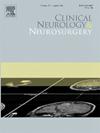Is rheumatoid arthritis associated with worse outcomes following adult spinal deformity surgery?
IF 1.8
4区 医学
Q3 CLINICAL NEUROLOGY
引用次数: 0
Abstract
Introduction
Rheumatoid arthritis (RA) is a chronic inflammatory disease, frequently involving the spine;however, its impact on adult spinal deformity (ASD) surgery outcomes remains inconclusive. In patients undergoing ASD surgery, we sought to evaluate: 1) impact of RA on mechanical complications and patient-reported outcome measures (PROMs) and 2) effect of steroid-use and disease modifying antirheumatic drugs DMARDs on postoperative outcomes.
Methods
A retrospective cohort study was performed for patients with RA undergoing ASD surgery from 2009 to 2021. Inclusion criteria were: ≥ 5-level fusion, and 2-year follow-up. The primary outcomes of interest were reoperation, mechanical complications and PROMs. Bivariate and multivariable analyses were performed.
Results
Among 238 patients undergoing ASD surgery, 34 (14.3 %) had RA, for a mean of 9.6 ± 4.4 years. Ten patients (29.4 %) were on steroids, and 14 (41.2 %) were on DMARDs preoperatively. Patients with RA had more proximal junctional kyphosis/ failure (PJK/F) (76.5 % vs. 42.6 %,p = 0.002), pseudarthrosis (44.1 % vs. 25.0 %,p = 0.021), and need for reoperation (58.8 % vs. 33.8 %, p = 0.005) compared to patients without RA, with no difference in other complications. On multivariable regression, RA was an independent predictor of PJK/F (OR=2.76, 95 %CI=1.03–7.39,p = 0.043) and reoperation (OR=2.51, 95 %CI=1.00–6.25,p = 0.048). Patients receiving DMARDs had a lower reoperation rate (28.6 % vs. 80.0 %,p = 0.003), with no significant difference in 2-year PROMs between the cohorts. Years of RA diagnosis or being on steroids had no association with outcomes.
Conclusion
RA significantly increased the risk of mechanical complications and reoperation following ASD surgery. However, the use of DMARDs reduced the likelihood of reoperation, emphasizing the importance of prioritizing medical management of RA patients prior to surgery.
成人脊柱畸形手术后类风湿关节炎是否与不良预后相关?
类风湿性关节炎(RA)是一种慢性炎症性疾病,常累及脊柱;然而,其对成人脊柱畸形(ASD)手术结果的影响尚无定论。在接受ASD手术的患者中,我们试图评估:1)RA对机械并发症和患者报告的结果测量(PROMs)的影响;2)类固醇使用和疾病改善抗风湿药物DMARDs对术后结果的影响。方法对2009 - 2021年接受ASD手术的RA患者进行回顾性队列研究。纳入标准为:≥ 5级融合,随访2年。主要关注的结果是再手术、机械并发症和PROMs。进行了双变量和多变量分析。结果238例接受ASD手术的患者中,34例(14.3 %)患有RA,平均9.6 ± 4.4年。10例患者(29.4 %)术前使用类固醇,14例患者(41.2 %)术前使用dmard。RA患者有更多的近端交界驼背/失败(PJK / F)(76.5 % 42.6 vs % p = 0.002),假关节(44.1 % 25.0 vs % p = 0.021),并需要再次手术(58.8 % 33.8 vs % p = 0.005)没有RA患者相比,在其他并发症的病例中没有区别。在多变量回归中,RA是PJK/F (OR=2.76, 95 %CI= 1.03-7.39,p = 0.043)和再手术(OR=2.51, 95 %CI= 1.00-6.25,p = 0.048)的独立预测因子。接受DMARDs的患者再手术率较低(28.6 % vs. 80.0 %,p = 0.003),两组间2年PROMs无显著差异。类风湿关节炎诊断年限或服用类固醇与结果无关。结论ra明显增加ASD术后机械并发症和再手术的风险。然而,dmard的使用降低了再手术的可能性,强调了在手术前对RA患者进行优先医疗管理的重要性。
本文章由计算机程序翻译,如有差异,请以英文原文为准。
求助全文
约1分钟内获得全文
求助全文
来源期刊

Clinical Neurology and Neurosurgery
医学-临床神经学
CiteScore
3.70
自引率
5.30%
发文量
358
审稿时长
46 days
期刊介绍:
Clinical Neurology and Neurosurgery is devoted to publishing papers and reports on the clinical aspects of neurology and neurosurgery. It is an international forum for papers of high scientific standard that are of interest to Neurologists and Neurosurgeons world-wide.
 求助内容:
求助内容: 应助结果提醒方式:
应助结果提醒方式:


